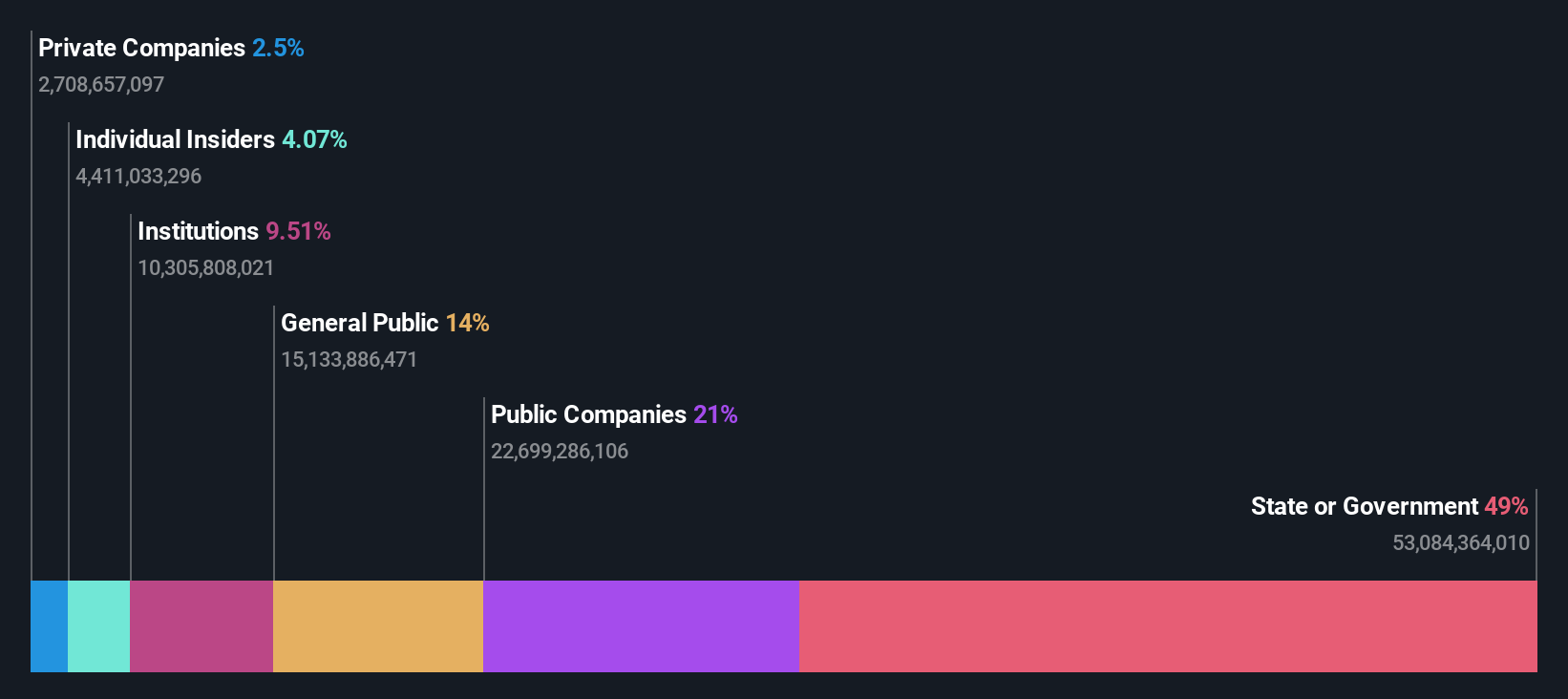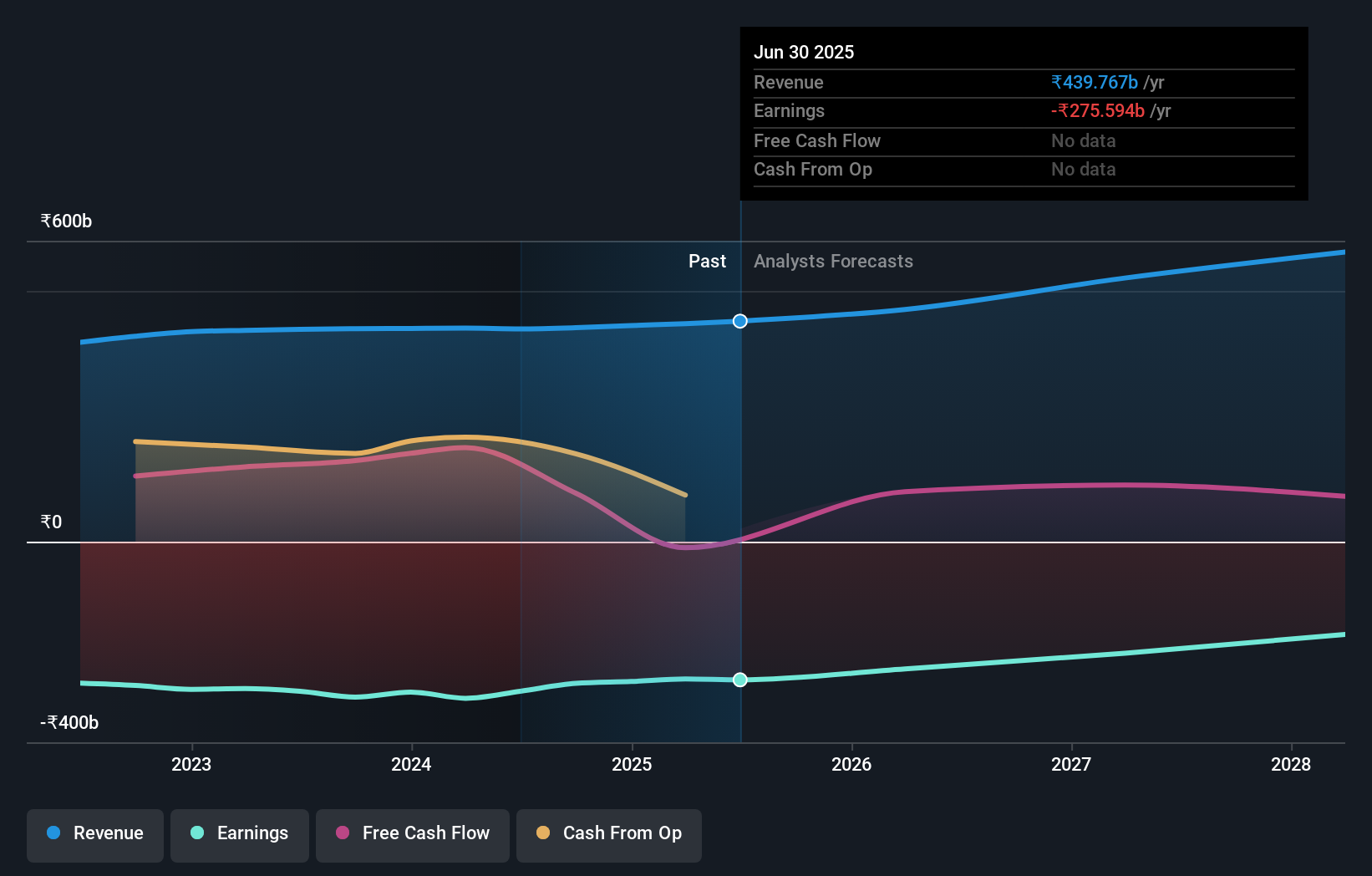- India
- /
- Wireless Telecom
- /
- NSEI:IDEA
State or government are Vodafone Idea Limited's (NSE:IDEA) biggest owners and were hit after market cap dropped ₹96b
Key Insights
- Vodafone Idea's significant state or government ownership suggests that the key decisions are influenced by shareholders from the larger public
- The top 2 shareholders own 65% of the company
- Analyst forecasts along with ownership data serve to give a strong idea about prospects for a business
Every investor in Vodafone Idea Limited (NSE:IDEA) should be aware of the most powerful shareholder groups. And the group that holds the biggest piece of the pie are state or government with 49% ownership. Put another way, the group faces the maximum upside potential (or downside risk).
And following last week's 9.3% decline in share price, state or government suffered the most losses.
In the chart below, we zoom in on the different ownership groups of Vodafone Idea.
See our latest analysis for Vodafone Idea

What Does The Institutional Ownership Tell Us About Vodafone Idea?
Institutional investors commonly compare their own returns to the returns of a commonly followed index. So they generally do consider buying larger companies that are included in the relevant benchmark index.
Vodafone Idea already has institutions on the share registry. Indeed, they own a respectable stake in the company. This can indicate that the company has a certain degree of credibility in the investment community. However, it is best to be wary of relying on the supposed validation that comes with institutional investors. They too, get it wrong sometimes. When multiple institutions own a stock, there's always a risk that they are in a 'crowded trade'. When such a trade goes wrong, multiple parties may compete to sell stock fast. This risk is higher in a company without a history of growth. You can see Vodafone Idea's historic earnings and revenue below, but keep in mind there's always more to the story.

Hedge funds don't have many shares in Vodafone Idea. The Government of India is currently the company's largest shareholder with 49% of shares outstanding. With 16% and 4.1% of the shares outstanding respectively, Vodafone Group Public Limited Company and Kumar Birla are the second and third largest shareholders. Kumar Birla, who is the third-largest shareholder, also happens to hold the title of Member of the Board of Directors.
To make our study more interesting, we found that the top 2 shareholders have a majority ownership in the company, meaning that they are powerful enough to influence the decisions of the company.
Researching institutional ownership is a good way to gauge and filter a stock's expected performance. The same can be achieved by studying analyst sentiments. There are plenty of analysts covering the stock, so it might be worth seeing what they are forecasting, too.
Insider Ownership Of Vodafone Idea
The definition of an insider can differ slightly between different countries, but members of the board of directors always count. The company management answer to the board and the latter should represent the interests of shareholders. Notably, sometimes top-level managers are on the board themselves.
I generally consider insider ownership to be a good thing. However, on some occasions it makes it more difficult for other shareholders to hold the board accountable for decisions.
We can report that insiders do own shares in Vodafone Idea Limited. It is a very large company, and board members collectively own ₹39b worth of shares (at current prices). we sometimes take an interest in whether they have been buying or selling.
General Public Ownership
With a 14% ownership, the general public, mostly comprising of individual investors, have some degree of sway over Vodafone Idea. While this group can't necessarily call the shots, it can certainly have a real influence on how the company is run.
Public Company Ownership
Public companies currently own 21% of Vodafone Idea stock. This may be a strategic interest and the two companies may have related business interests. It could be that they have de-merged. This holding is probably worth investigating further.
Next Steps:
It's always worth thinking about the different groups who own shares in a company. But to understand Vodafone Idea better, we need to consider many other factors. To that end, you should learn about the 4 warning signs we've spotted with Vodafone Idea (including 3 which are significant) .
If you would prefer discover what analysts are predicting in terms of future growth, do not miss this free report on analyst forecasts.
NB: Figures in this article are calculated using data from the last twelve months, which refer to the 12-month period ending on the last date of the month the financial statement is dated. This may not be consistent with full year annual report figures.
New: Manage All Your Stock Portfolios in One Place
We've created the ultimate portfolio companion for stock investors, and it's free.
• Connect an unlimited number of Portfolios and see your total in one currency
• Be alerted to new Warning Signs or Risks via email or mobile
• Track the Fair Value of your stocks
Have feedback on this article? Concerned about the content? Get in touch with us directly. Alternatively, email editorial-team (at) simplywallst.com.
This article by Simply Wall St is general in nature. We provide commentary based on historical data and analyst forecasts only using an unbiased methodology and our articles are not intended to be financial advice. It does not constitute a recommendation to buy or sell any stock, and does not take account of your objectives, or your financial situation. We aim to bring you long-term focused analysis driven by fundamental data. Note that our analysis may not factor in the latest price-sensitive company announcements or qualitative material. Simply Wall St has no position in any stocks mentioned.
About NSEI:IDEA
Good value with slight risk.
Similar Companies
Market Insights
Community Narratives



